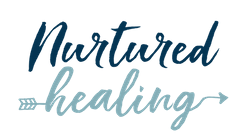I have always found it fitting that my name is Carrie.
For so long, I felt that I was always “carrying” stuff. In my younger years, I was lugging my things to and from school - I had a year in elementary school without a backpack for some reason. And once I was older, I always seemed to have my arms full walking into work.
Of course, once I had children, I felt that I was truly living up to my name. I barely had enough room to tote the tiny humans themselves between the diaper bag, toys, blankets, teethers, and endless snacks.
With the focus on the external, physical stuff, I never paid much attention to what was going on inside. I would get stressed or face complicated feelings, and I would blame it on not enough time, organization, sleep, money, or maybe even someone or something outside of myself.
As an adult, I found myself pushing the stress and complicated feelings away and numbing them by distracting myself with my family, friends, shopping, social media, alcohol, or just plain busyness. The distraction options were and still are plentiful.
I didn’t realize that the inside, invisible “stuff” was adding up to a hefty load. Not only was I carrying my everyday stressors, but I was also carrying my childhood “stuff.” The residual, unprocessed emotions from family or friend interactions go awry, from micro-traumas growing up, or from experiences in which I didn’t have a sense of felt safety.
Of course, as a fellow human, I still have experiences that result in stress and difficult emotions, but I understand that I need to meet them head-on for them not to fester and linger. I know that I need to respond to them, not add them to my load and carry them around.
Two weeks ago, I encountered a situation that gave me a good chance to practice meeting a difficulty head-on. We had a family issue arise that I felt completely blindsided by. To further complicate things, I wasn’t the only one involved, so I had to process my own emotions regarding the issue, and I had to hold space for and respond to the family member affected.
What I Did For Myself
Made Time - I cleared my calendar as much as possible and sat with the difficult feelings, including guilt, sadness, anger, and embarrassment. I didn’t push through and past them as I would have tried in the past.
For my mental state, I used meditation and tapping to learn more about where my emotions stemmed from and I had a good cry. I also used a self-compassion practice to offer myself warmth and understanding during a tough time.
For my physical state, I recognized the activation in my body and planned a walk to help the emotional energy move. I also took stress supplements to help calm the biochemical reaction that I could feel mounting inside. Lastly, I used wearable tech (Hapbee and Apollo Neuro*) to help shift my state.
Once I calmed my body’s stress response, my brain came back online, and I felt like I could think more clearly about the situation.
Zoomed Out - I imagined how I would reflect on this situation 1-year, 5-years, and 10-years out. I also asked myself how I would feel if this was the worst thing that happened during my/the family member’s lifetime.
Zooming out helped me gain perspective on the issue. Although it still needed to be responded to, I was able to see it from a different angle. From that vantage point, I could respond more mindfully instead of reacting emotionally.
Asked for Help - I reached out to friends who I knew would be a listening ear. I know that I process situations verbally, so having people open to listening was essential for me to move forward.
How I Supported the Family Member
Active Listening - Just as my friends listened to me. I focused on listening with my whole body to the family member. This meant truly listening, not waiting to talk, and not offering my two sense.
Held Space - While listening, I focused on being truly present for the other person, which meant phone down and total focus on them. A big part of this was reserving judgment and not going into problem-solving or advice-giving mode.
Mistakes are Not a Reflection of Us - I recognized that this person is human and tried to provide reassurance, when it made sense, that all humans make mistakes and our mistakes do not define us. They are not a reflection of who we are. I also shared that mistakes help us learn and grow, and we all make them.
My response to the difficult situation wasn’t perfect, and it definitely wasn’t pretty, but the result was what I was hoping for - the ability to mindfully respond to and look at it from a lighter place. I don’t feel like I am “carrying” the weight of it forward and I don’t feel like the family member is hanging on to it either.
While I am not quite at the meaning behind my name, which is “free,” I feel like I am getting better at releasing emotional weight and putting down what I no longer need to carry.
How do you respond to yourself and others during challenging times?
Are you carrying around emotions that you are ready to release?
*I am an affiliate for Apollo Neuro because I truly believe in and feel it’s power on a regular basis. If you make a purchase I will make a small commission at no cost to you.







